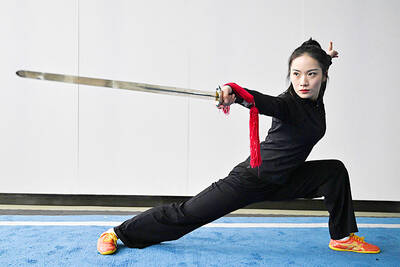A report by Japanese and South Korean scholars released yesterday highlights the deep differences over the two nations' interpretation of history -- a fact underscored by a newly released poll that shows 90 percent of South Koreans don't trust Japan.
Commissioned in 2001 by Japanese and South Korean leaders and launched a year later, the joint report was meant to help ease political tensions following a furor over a Japanese textbook that was criticized for revealing little about Japan's World War II military aggressions.
After 16 meetings, however, the report's 16 Japanese and 15 South Korean authors acknowledged three "difficult" years writing the report that largely failed to find any substantial common ground.
"There were many differences of opinion, such as those over diplomatic ties in East Asia and their evolution; treaties between Japan and South Korea; Japan's colonial rule over Korea and societal changes; and several bilateral issues emerging after 1945," it said.
The 2,000-page review -- covering ancient to modern history -- gave a glimpse of the obstacles the rivals face in improving relations. Among the disagreements that continue to impede ties are those over Japan's 35-year colonization of the Korean Peninsula and its aftermath.
Japan ruled the peninsula from 1910-1945, harshly quashing dissent. Historians say Tokyo used Korean men as forced laborers and Korean women as sex slaves for Japanese soldiers.
In the report, South Korean scholars said Tokyo imposed its will on Koreans to seal a 1905 pact that made the entire peninsula a Japanese protectorate, and a 1910 annexation treaty that turned it into Japanese territory. Japanese scholars said the two sides had agreed to the arrangement.
The South Korean scholars also argued that Koreans had a right to demand compensation from the Japanese government for wartime atrocities, while the Japanese side said all such claims -- dozens are under review in Japan's courts -- were settled by postwar treaties.
The familiar arguments from both sides coincided with a poll published yesterday in Japan's national Yomiuri newspaper showing that 90 percent of South Koreans said they don't trust Japan.
The level of mistrust was up 15 percentage points from three years ago and the highest in four surveys conducted since 1995.
Eighty-nine percent of South Korean respondents also described relations between their country and Japan as "bad," up 22 points from 2002, the Yomiuri said.
Asked about the cause of the rift, South Koreans overwhelmingly cited competing claims over islets called Dokdo in Korean and Takeshima in Japanese.
That fight flared in March after a local government in Japan voted to set Feb. 22 as a day commemorating Japanese claims to the isles. Seoul later let dozens of tourists visit one of the islets, and called Japan's claim tantamount to a lack of remorse over its past. The islets are surrounded by rich fishing waters and controlled by South Korea, which has a small police unit there.
In contrast to their neighbors, 60 percent of Japanese surveyed described Japan-South Korea relations as "good," up 13 points, and a similar proportion expressed trust in South Korea. That may be partly attributable to a Korea boom in Japan that was started by a Korean soap opera that won a surprise following last year.

ANGER: A video shared online showed residents in a neighborhood confronting the national security minister, attempting to drag her toward floodwaters Argentina’s port city of Bahia Blanca has been “destroyed” after being pummeled by a year’s worth of rain in a matter of hours, killing 13 and driving hundreds from their homes, authorities said on Saturday. Two young girls — reportedly aged four and one — were missing after possibly being swept away by floodwaters in the wake of Friday’s storm. The deluge left hospital rooms underwater, turned neighborhoods into islands and cut electricity to swaths of the city. Argentine Minister of National Security Patricia Bullrich said Bahia Blanca was “destroyed.” The death toll rose to 13 on Saturday, up from 10 on Friday, authorities

Local officials from Russia’s ruling party have caused controversy by presenting mothers of soldiers killed in Ukraine with gifts of meat grinders, an appliance widely used to describe Russia’s brutal tactics on the front line. The United Russia party in the northern Murmansk region posted photographs on social media showing officials smiling as they visited bereaved mothers with gifts of flowers and boxed meat grinders for International Women’s Day on Saturday, which is widely celebrated in Russia. The post included a message thanking the “dear moms” for their “strength of spirit and the love you put into bringing up your sons.” It

In front of a secluded temple in southwestern China, Duan Ruru skillfully executes a series of chops and strikes, practicing kung fu techniques she has spent a decade mastering. Chinese martial arts have long been considered a male-dominated sphere, but a cohort of Generation Z women like Duan is challenging that assumption and generating publicity for their particular school of kung fu. “Since I was little, I’ve had a love for martial arts... I thought that girls learning martial arts was super swaggy,” Duan, 23, said. The ancient Emei school where she trains in the mountains of China’s Sichuan Province

DISASTROUS VISIT: The talks in Saudi Arabia come after an altercation at the White House that led to the Ukrainian president leaving without signing a minerals deal Ukrainian President Volodymyr Zelenskiy was due to arrive in Saudi Arabia yesterday, a day ahead of crucial talks between Ukrainian and US officials on ending the war with Russia. Highly anticipated negotiations today on resolving the three-year conflict would see US and Ukrainian officials meet for the first time since Zelenskiy’s disastrous White House visit last month. Zelenskiy yesterday said that he would meet Saudi Arabian Crown Prince Mohammed bin Salman, the nation’s de facto leader, after which his team “will stay for a meeting on Tuesday with the American team.” At the talks in the Red Sea port city of Jeddah, US